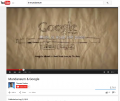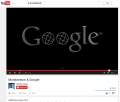Not dissimilar
From Mondothèque
1998
François Schuiten explains the reasoning behind his scenography for the resurrected Mundaneum, just before it's re-opening in 1998
2003
'Otlet imagined a day when users would access the database from great distances by means of an “electric telescope” connected through a telephone line, retrieving a facsimile image to be projected remotely on a flat screen. In Otlet’s time, this notion of networked documents was still so novel that no one had a word to describe these relationships, until he invented one: “links.” Otlet envisioned the whole endeavor as a great “réseau”—web—of human knowledge.'[1]
2007
Bernard Otlet (great-grandson): Paul Otlet, inventor of the internet [2]
2008
'Building Society, Constructing Knowledge, Weaving the Web: Otlet’s Visualizations of a Global Information Society and His Concept of a Universal Civilization'[3]
'Paul Otlet's visionary Mundaneum was a proto-internet made of 3-by-5-inch index cards'[4]
2009
Jean-Michel Djian, "Le Mundaneum, Google de papier" & "le Mundaneum, a posé les bases de la science documentaire – et préfigurait Internet avec un siècle d’avance."
Jean-Paul Deplus quoted in Jean-Michel Djian: "Ils ont inventé Google avant la lettre. Non seulement ils l’ont fait avec les seuls outils dont ils disposaient, c’est-à-dire de l’encre et du papier, mais leur imagination était si féconde que l’on a retrouvé les dessins et croquis de ce qui préfigure Internet un siècle plus tard."[5]
2010
'He also wrote extensively about the need for a universal network for the communication of knowledge. His theoretical approach to the organi-zation and dissemination of information was far ahead of its time, notably in foreshadowing the Internet, Hypertext, and the World Wide Web.'[6]
2011
"Netzvisionär Paul Otlet: Googles genialer Urahn. Er plante ein mechanisches Gehirn und kabellose Kommunikation: Der belgische Bibliothekar Paul Otlet entwarf Anfang des 20. Jahrhunderts die erste Suchmaschine der Welt - lange vor Computern und Internet. Warum gerieten seine revolutionären Ideen in Vergessenheit?"[7]
'Our view is that the creative ways in which he [Paul Otlet] faces tensions of scalability, representation, and perception of relationships between knowledge objects might be of interest today.'[8]
2012
Paul Otlet, Visionnaire. Video shown at the signing of the collaboration between Mundaneum and Google
2013
Renaissance 2.0 Voyage aux origines du web
'The unsung heroes of the Internet'[9]
2014
From industrial heartland to Internet age round 2
To Google or not to Google, that's the question Sylvia Van P
'The idea of the internet was born in Belgium. Idea No.1: The Mundaneum'[10]
"L'homme qui a presque inventé le cyberespace : Paul Otlet"[11]
"Le père (belge) de l’idée du web"[12]
2015
"C’est « Le Monde » qui appelé le Mundaneum, « Google de papier », une expression qui a fait florès. (...) C’est dans la ville du doudou qu’on peut désormais revoir ce qui reste de cette grandiose utopie, d’avant l’ordinateur."[13]
'Years later, Paul brought clarity and a future to the project through his vision for the Mundaneum: a universal system of written, visual, and audio information that people could access from the comfort of their own homes. The roots of that vision took hold just a few decades later when engineers planted the technological seeds that brought electronic information sharing to life.'[14]
'Today’s decision underlines what people who use the service tell us: Google Books gives them a useful and easy way to find books they want to read and buy, while at the same time benefiting copyright holders,” said Gina Scigliano, a spokeswoman for Google. “We’re pleased the court has confirmed that the project is fair use, acting like a card catalog for the digital age.'[15]- ↑ Alex Wright: Forgotten Forefather: Paul Otlet http://boxesandarrows.com/forgotten-forefather-paul-otlet
- ↑ "Paul Otlet: le rêve et la norme", 6 Feb. 2007: http://www.sonuma.be/archive/paul-otlet-le-r%C3%AAve-et-la-norme (min. 3:00)
- ↑ Van den Heuvel, C. Building society, constructing knowledge, weaving the web. Otlet’s visualizations of a global information society and his concept of a universal civilization. In W.B. Rayward (Ed.), (2008) European Modernism and the Information Society (pp. 127–153). London: Ashgate.
- ↑ When the internet was made of paper. By: Collins, Paul, New Scientist, 02624079, 3/22/2008, Vol. 197, Issue 2648
- ↑ Jean-Michel Djian, "Le Mundaneum, Google de papier," Le Monde Magazine, 19 December 2009, p. 46-50.
- ↑ Rayward, Warden Boyd (who translated and adapted), Mundaneum: Archives of Knowledge, Urbana-Campaign, Ill. : Graduate School of Library and Information Science, University of Illinois at Urbana-Champaign, 2010. Original: Charlotte Dubray et al., Mundaneum: Les Archives de la Connaissance, Bruxelles: Les Impressions Nouvelles, 2008.
- ↑ Netzvisionär Paul Otlet: Googles genialer Urahn. Meike Laaf, Der Spiegel 20.07.2011 http://www.spiegel.de/netzwelt/web/netzvisionaer-paul-otlet-googles-genialer-urahn-a-768312.html
- ↑ Charles van den Heuvel, W. Boyd Rayward, Facing Interfaces: Paul Otlet's Visualizations of Data Integration. Journal of the American society for information science and technology (2011)
- ↑ http://expositions.mundaneum.org/fr/conferences/linventeur-de-linternet-vinton-cerf-en-conference
- ↑ Jim Boulton: 100 ideas that changed the web Laurence King Publishing, 2014
- ↑ http://expositions.mundaneum.org/fr/conferences/lhomme-qui-presque-invente-le-cyberespace-paul-otlet
- ↑ http://expositions.mundaneum.org/fr/conferences/lhomme-qui-presque-invente-le-cyberespace-paul-otlet
- ↑ Le Mundaneum, le Google de papier. La Libre Belgique, 06.08.15 http://www.lalibre.be/culture/arts/le-mundaneum-le-google-de-papier-55c36e8b35708aa437655a75
- ↑ http://www.google.com/doodles/mundaneum-co-founder-paul-otlets-147th-birthday
- ↑ http://www.bloomberg.com/news/articles/2015-10-16/google-wins-appeals-court-approval-of-book-scanning-project-iftpwxl3





















